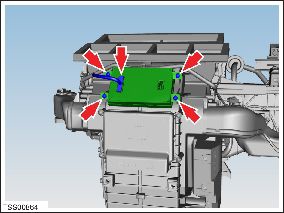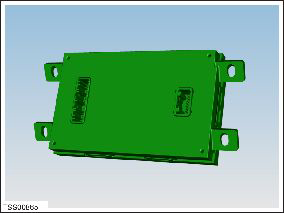Tesla Model S: Module - HVAC Controller - RCCM (Remove and Replace)
Tesla Model S (2012-2026) Service Manual / Electrical / Module - HVAC Controller - RCCM (Remove and Replace)
Removal
- Remove the IP carrier (refer to procedure).
- Disconnect the HVAC harness connector from the Remote Climate Control Module (RCCM).
- Remove the screws (x4) that secure the RCCM to the HVAC casing.

- Remove the RCCM from the HVAC mounting.

Installation procedure is the reverse of removal, except for the following: Use Toolbox to update or redeploy the firmware:
- If the vehicle is not running the latest firmware, run the "Vehicle Firmware Update" procedure.
- If the vehicle is running the latest firmware, run the "Firmware Redeploy" procedure.
READ NEXT:
 Module - Seat Heater - Driver's Seat (Remove and Replace)
Module - Seat Heater - Driver's Seat (Remove and Replace)
Removal
Open door.
Power seat height adjust fully upwards for access.
Disconnect seat heater module connectors and harnesses (x2).
 Module - TPMS - Baolong (Remove and Replace)
Module - TPMS - Baolong (Remove and Replace)
Warning: If the vehicle has air suspension, activate "Jack"
mode on the touchscreen before raising and supporting the vehicle.
Removal
Raise and support the vehicle (refer to pro
 Module - TPMS - Continental (Remove and Replace)
Module - TPMS - Continental (Remove and Replace)
Removal
Remove RH rear seat bolster (refer to procedure).
Remove the 2nd row seat cushion (refer to procedure).
Release the lower section of the RH sill panel to access the
TPMS E
SEE MORE:
 Antenna - GSM - LH (Remove and Replace)
Antenna - GSM - LH (Remove and Replace)
Note: The GSM antenna is a component within the door
mirror assembly. If the GSM antenna develops a fault, the whole
mirror assembly must be replaced.
Removal
Remove the door mirror assembly (refer to procedure).
Remove the door mirror
 General Precautions
General Precautions
The supplementary restraint system (SRS) includes air bags, pre-tensioners,
and other safety-related components. The SRS contains components which
could be potentially hazardous to the technician if not serviced and
handled correctly.
Warning: Always follow these precautions and the relev
© 2019-2026 Copyright www.tesms.org

